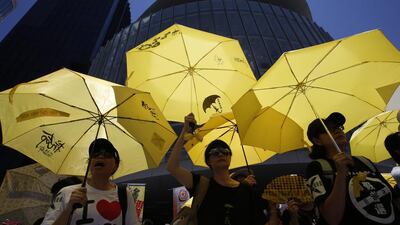HONG KONG // Hong Kong lawmakers on Thursday rejected a Beijing-backed electoral reform package derided as “fake democracy” during mass protests last year, leaving the city in deadlock over how its leader should be chosen.
Twenty-eight lawmakers voted against the proposal in the legislature, denying chief executive Leung Chun-ying the two-thirds majority needed for its passage. Most of the supporters in the 70-member legislature walked out just before the vote in a failed effort to deny a quorum, leaving only eight votes in favour.
Mr Leung said that he was “disappointed” by the result and that political reform was now off the table.
The government’s electoral roadmap would have given all residents the right to vote for the chief executive for the first time in 2017, but only able to choose from candidates vetted by a Beijing loyalist committee.
“This result is not what we want to see,” Beijing’s foreign ministry spokesman Lu Kang said after the vote.
He added that China wanted to “press ahead with the democratic development of Hong Kong” in the interests of stability and prosperity in the former British colony.
Analysts agreed that Beijing was unlikely to alter its stance on the vetting of candidates, and authorities in Hong Kong have said the political reform debate is now off the table for 2017.
That means the next chief executive will be chosen by a 1,200-strong pro-Beijing committee, as was current leader, the unpopular Leung Chun-ying.
“Political reform will effectively grind to a halt,” said Shi Yinhong, international relations professor at Beijing’s Renmin University.
“There is unlikely to be a new [reform] proposal from China’s government,” he said.
Pro-democrat lawmakers did not cast their defeat of the vote as a victory, with some saying that it was just the beginning of a long battle.
Hong Kong is largely self-governing after being handed back to China by Britain in 1997 and enjoys much greater freedoms than on the mainland, but there are fears that these are being eroded.
Despite Thursday’s vote, sanalysts say the pro-democracy campaign risks fragmenting as frustrations grow over the lack of progress, and that smaller radical splinter groups could emerge.
Beijing has not made it clear how it will respond to what was a slap in the face for the mainland authorities.
Chinese top legislature emphasised on Thursday that the issue was non-negotiable, saying its decision last August to insist on the vetting of candidates will remain in force in the future, state media reported.
Authorities in Beijing and Hong Kong have accused the democracy camp of denying residents their chance to choose and risking destabilising the city.
Other analysts say that Beijing may take a harder line against Hong Kong, but given its importance as a finance hub, they are likely to avoid any measures that could dent its economic prosperity.
“Possibly China will draw some lessons from this, and make some changes in its Hong Kong policy. Some matters may be treated more harshly,” said Mr Shi.
Around 100 pro-democracy supporters outside the legislature cheered at the vote on Thursday, punching the air and hugging each other as the result was broadcast live on a big screen.
“I’m excited!” said 30-year-old IT worker Ken Tsang. “An undemocratic proposal should not be passed. It was a proposal that would only benefit those in power.”
Hundreds of pro-government supporters, who had gathered at the harbourfront assembly, shouted through loudspeakers to “vote out” the democrats.
“I’m very disappointed that I cannot have my vote [for a leader],” said Leung Ting-to, 63, who was standing with the pro-Beijing camp.
“Hong Kong ... was given the chance to have universal suffrage, but the democrats took it away.”
Civic Party leader Alan Leong said that it would “go down in history” that only eight people supported the bill.
“The message that we are sending to the central people’s government and the Hong Kong government is that Hong Kong people do not want to take on this fake democratic package,” he said.
* Agence France-Presse and Bloomberg

